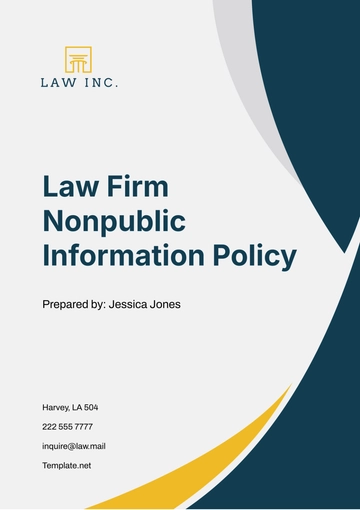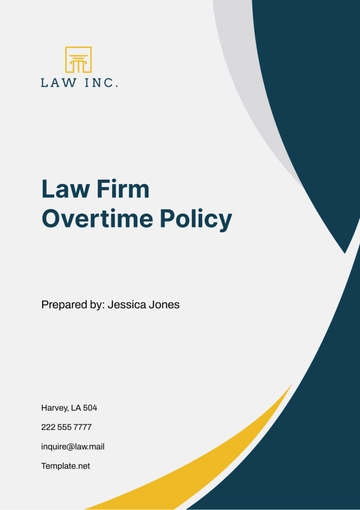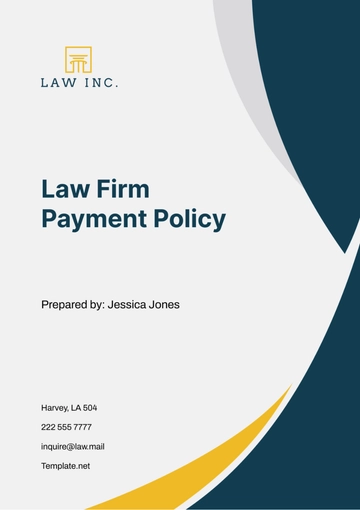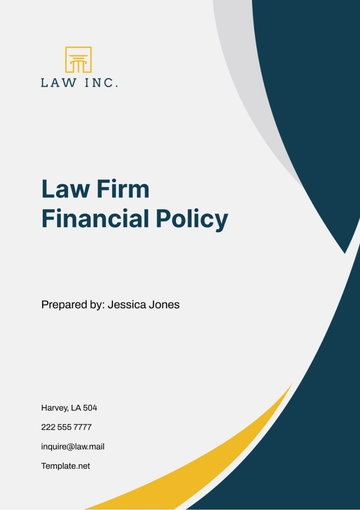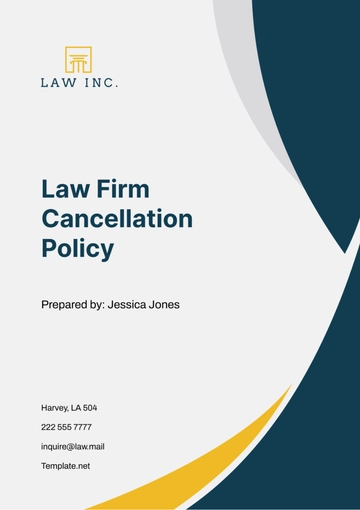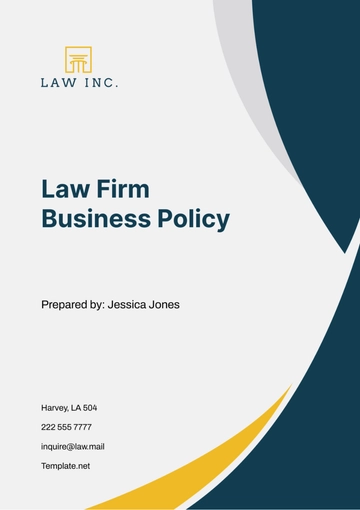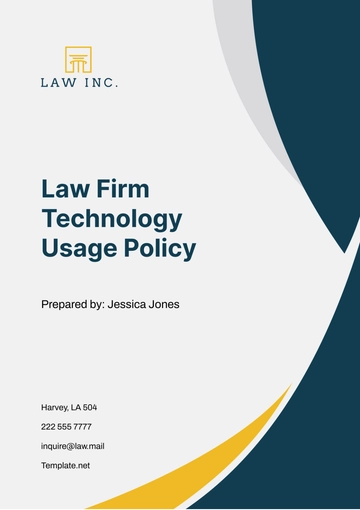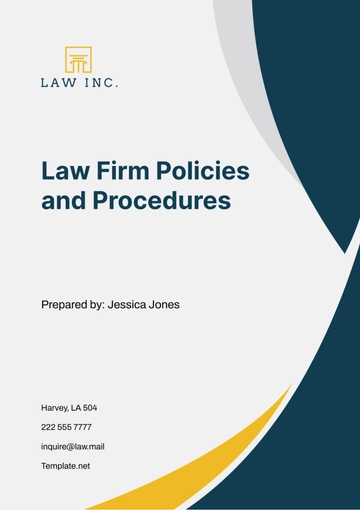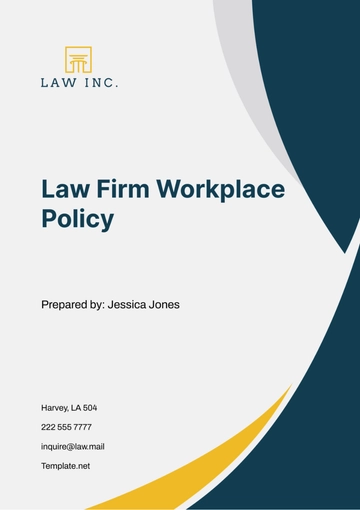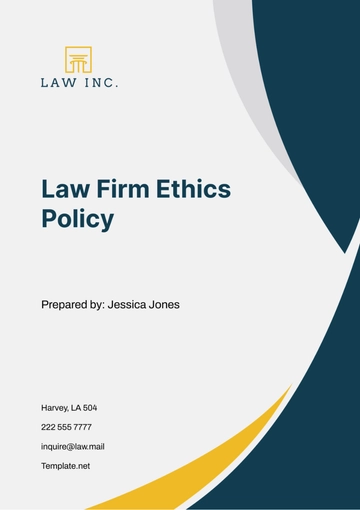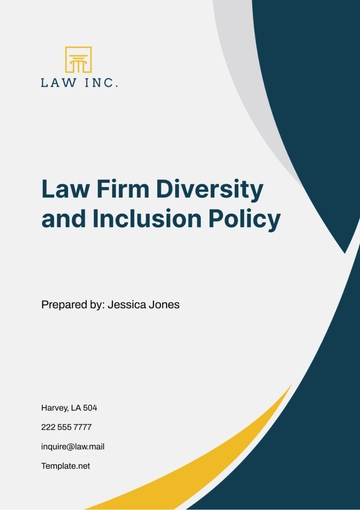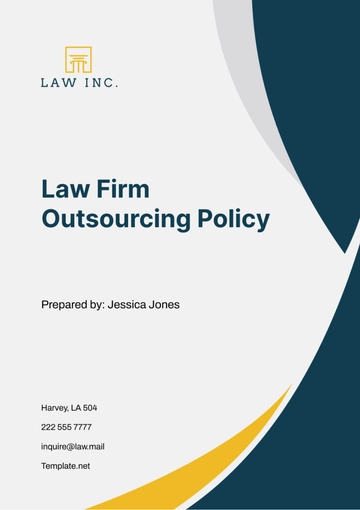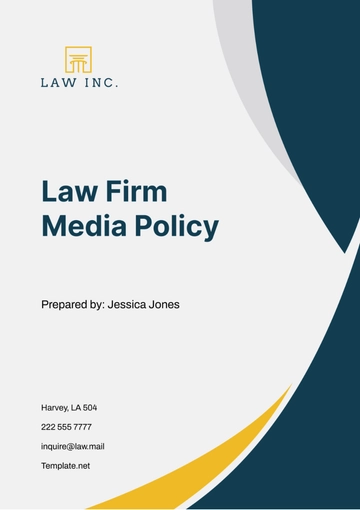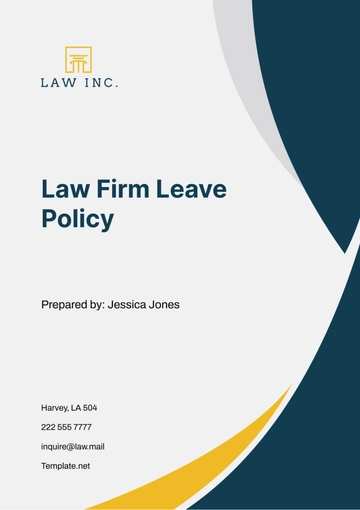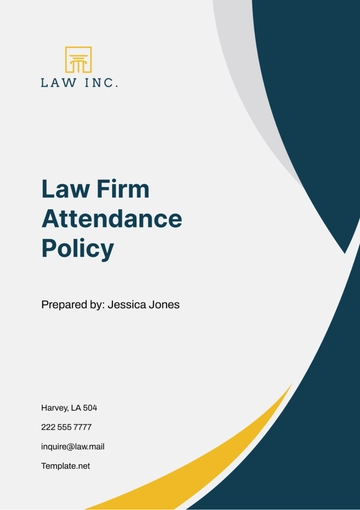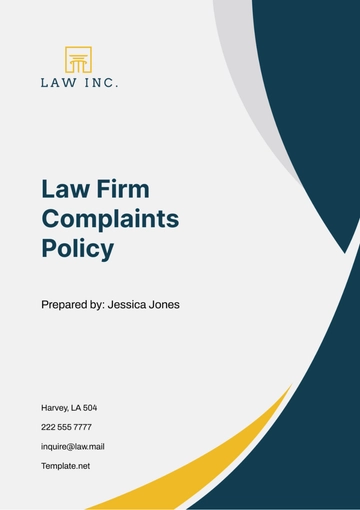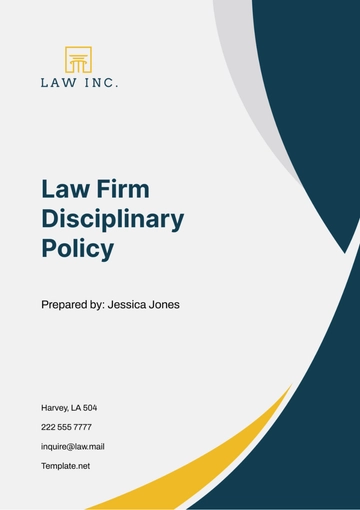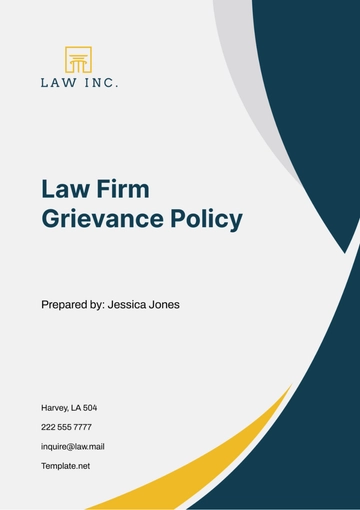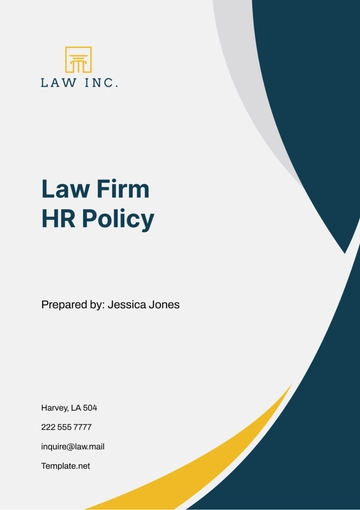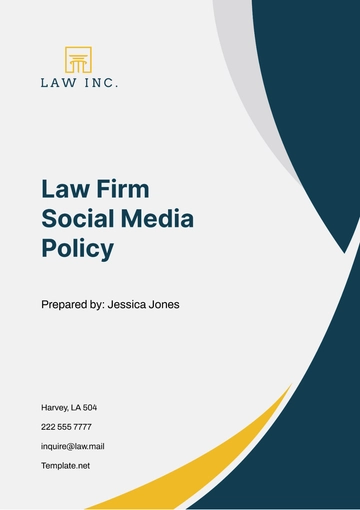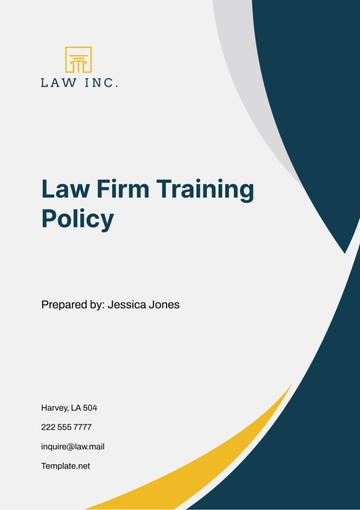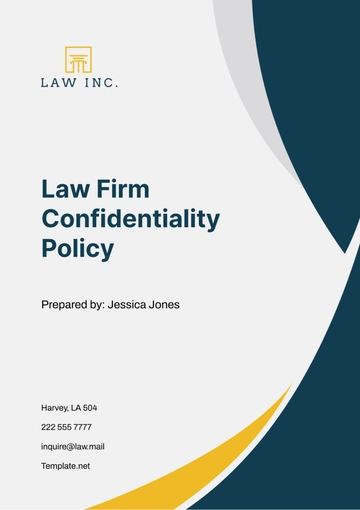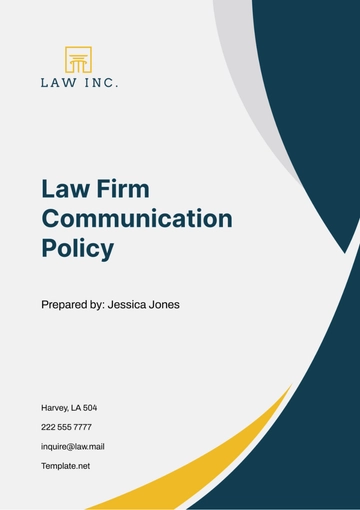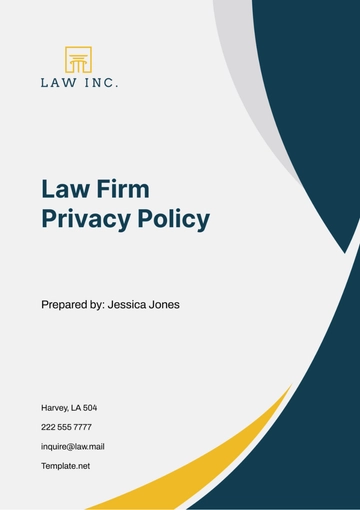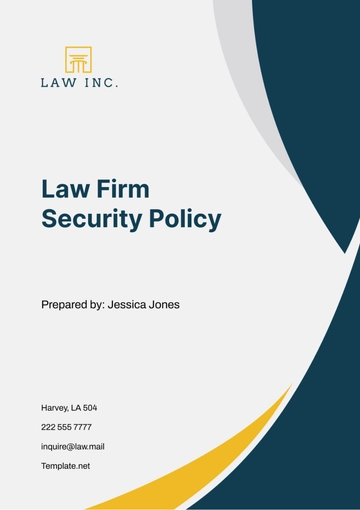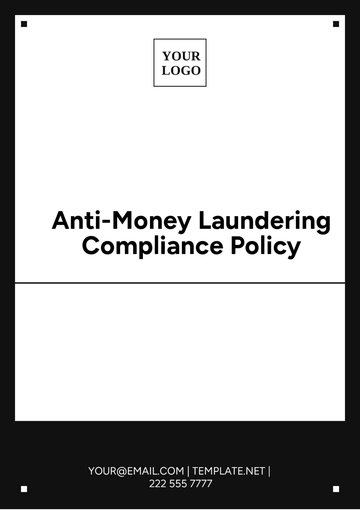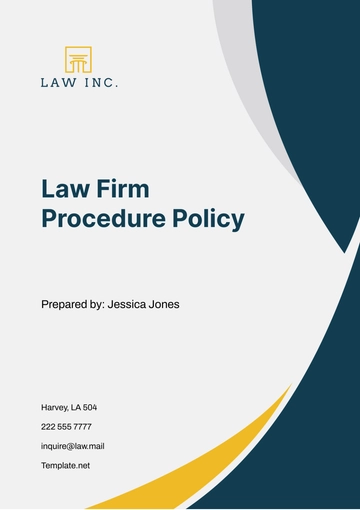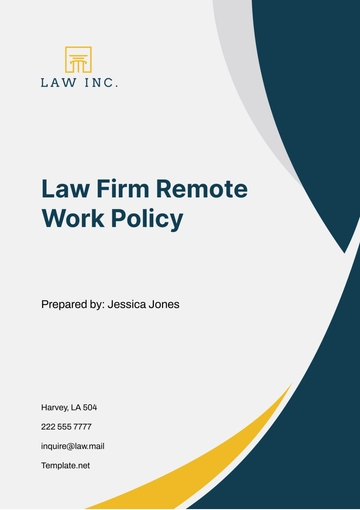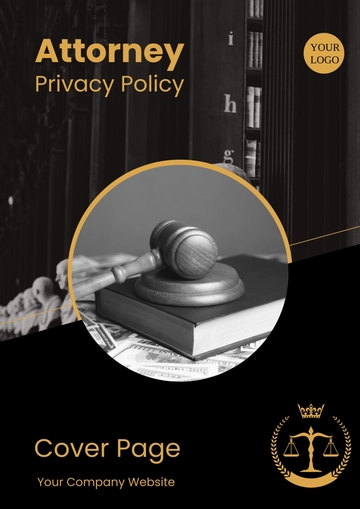Free Law Firm Social Media Policy
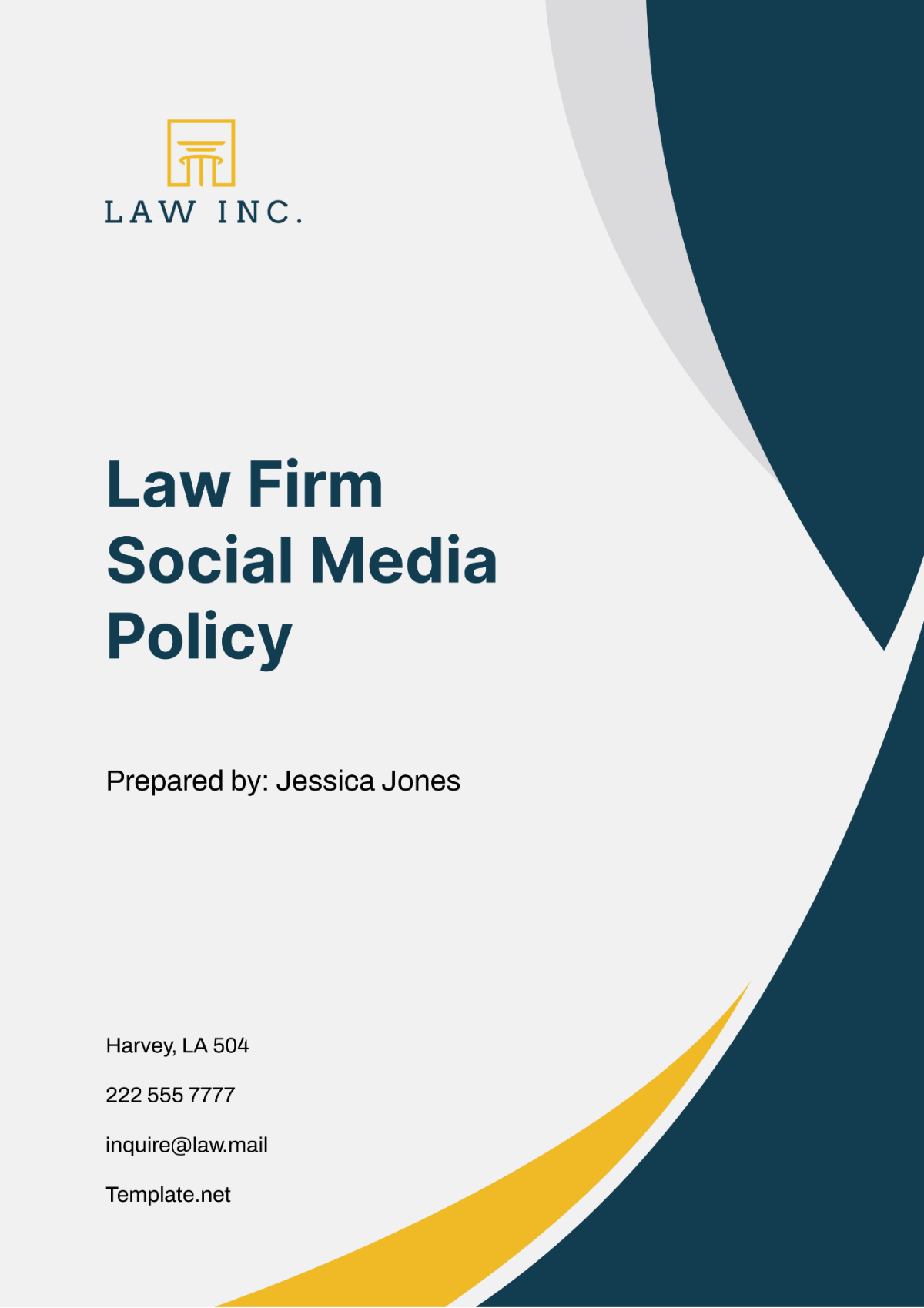
I. Introduction
The advent of social media has transformed the way we communicate and share information. For [Your Company Name], it presents both opportunities and challenges. This Social Media Policy is designed to guide our employees in navigating the complex landscape of social media in a manner that upholds our firm’s values, professional standards, and legal obligations.
A. Purpose of the Policy
Guidance: The primary purpose of this policy is to provide clear guidance to all employees on the appropriate use of social media. This includes understanding the potential impact of their online activities on their professional reputation, the reputation of [Your Company Name], and our clients.
Risk Mitigation: This policy aims to mitigate the risks associated with social media use, including breaches of client confidentiality, damage to our firm’s reputation, and legal issues.
Promoting Positive Engagement: The policy also aims to encourage employees to engage positively and professionally on social media, contributing to our firm’s online presence and reputation.
Compliance with Laws and Regulations: The policy ensures that our firm and its employees comply with all relevant laws and regulations related to social media use, including privacy laws, defamation laws, and professional conduct standards.
Continuous Learning and Adaptation: Given the dynamic nature of social media, this policy also aims to promote continuous learning and adaptation, helping our employees stay abreast of emerging trends, platforms, and best practices in social media use.
B. Scope of the Policy
Who it Applies To: This policy applies to all employees of [Your Company Name], regardless of their position or role within the firm. It covers both professional use of social media (i.e., when acting in an official capacity as a representative of our firm) and personal use of social media (i.e., when acting in a personal capacity).
What it Covers: The policy applies to all forms of social media and online platforms, including but not limited to social networking sites (e.g., Facebook, LinkedIn), microblogging sites (e.g., Twitter), blogs and forums, multimedia sharing sites (e.g., YouTube, Instagram), and review sites (e.g., Yelp).
What it Governs: The policy governs all content posted by our employees on social media, including text, images, videos, and links. It also covers interactions with other users on these platforms, such as comments, likes, shares, and direct messages.
II. Professional Use of Social Media
The professional use of social media can be a powerful tool for [Your Company Name] in terms of marketing, networking, and information sharing. However, it’s important that such use aligns with our firm’s values and professional standards.
A. Representing [Your Company Name]
When using social media in a professional capacity, employees are often seen as representatives of [Your Company Name]. Therefore, their conduct can reflect on the firm.
Professionalism: Employees should always conduct themselves professionally on social media. This includes being respectful, thoughtful, and accurate in all communications.
Accuracy: When posting about [Your Company Name] or its services, employees should ensure that all information is accurate and up-to-date. Misinformation can harm our firm’s reputation and potentially lead to legal issues.
Confidentiality: Confidentiality is a cornerstone of the legal profession. Employees must not disclose any confidential or proprietary information about our firm or our clients on social media. This includes client details, case information, and internal firm matters.
Respect for Intellectual Property: Employees should respect intellectual property rights when posting content on social media. This includes obtaining necessary permissions for using copyrighted materials.
Compliance with Laws and Regulations: Employees should ensure that their use of social media complies with all applicable laws and regulations. This includes laws related to defamation, privacy, and harassment.
B. Interacting with Clients and Colleagues
Social media can facilitate interactions with clients and colleagues. However, these interactions should always be professional and respectful.
Respect and Professionalism: Employees should always treat clients, colleagues, and other individuals they interact with on social media with respect and professionalism.
Privacy: Employees should respect the privacy of others. They should not post personal information about clients or colleagues without their consent.
Harassment and Discrimination: Harassment and discrimination are not tolerated at [Your Company Name], including on social media. Employees should not post content that is harassing, discriminatory, or offensive.
Client Communications: When communicating with clients on social media, employees should maintain the same level of professionalism as they would in other forms of communication. They should also be mindful of client confidentiality and avoid discussing specific cases or legal matters on social media.
Conflict of Interest: Employees should avoid any social media interactions that could create a conflict of interest or the appearance of a conflict of interest.
C. Endorsements and Affiliations
When using social media, employees should be mindful of how their endorsements or affiliations may be perceived.
Endorsements: If an employee endorses a client, partner, or other business entity on social media, it may be perceived as an endorsement by [Your Company Name]. Employees should make it clear that any endorsements are their own personal opinions and not those of the firm.
Affiliations: Employees should be transparent about their affiliations with [Your Company Name] when posting on social media. However, they should also make it clear that their posts are their own and do not necessarily reflect the views of the firm.
Disclaimers: If an employee’s social media account is public and they talk about work-related matters, they should include a disclaimer in their profile stating that their views are their own.
Promotion: Employees should avoid excessive self-promotion or promotion of [Your Company Name] on their personal social media accounts. While it’s acceptable to share achievements or news about the firm, this should not dominate their personal social media activity.
Influencer Activities: If employees have a significant online following and engage in influencer activities, they should be particularly careful to separate these activities from their role at [Your Company Name]. They should not use their affiliation with the firm to promote products or services without explicit permission from the firm.
III. Personal Use of Social Media
While [Your Company Name] respects the right of employees to use social media for personal purposes, employees must remember that the content they post may affect their professional image and the image of the firm.
A. Personal Responsibility
Personal Conduct: Employees are personally responsible for what they post on social media. They should think carefully before posting and consider how their content might be perceived by others.
Respect for Others: Employees should always treat others with respect on social media. They should not post content that is offensive, discriminatory, or disrespectful.
Privacy Settings: Employees should make use of privacy settings to control who can see their content. However, they should remember that anything posted online could potentially be seen by anyone, including clients or colleagues.
Legal Consequences: Employees should be aware that their personal use of social media could have legal consequences. For example, posting defamatory comments or confidential information could result in legal action against the employee and/or [Your Company Name].
Time Management: While the firm recognizes that employees may use social media during their personal time, excessive use of social media during work hours can impact productivity and is discouraged.
B. Conflict of Interest
Avoiding Conflicts: Employees should avoid any social media activity that could create a conflict of interest or damage the firm’s interests.
Non-Endorsement: Employees should not use social media to endorse clients, suppliers, or other business partners without approval from the firm.
Disclosure of Affiliation: If employees post content related to [Your Company Name] or its business, they should clearly disclose their affiliation with the firm.
Competitor Interactions: Employees should exercise caution when interacting with competitors on social media. They should not disclose sensitive information or engage in activities that could give competitors an unfair advantage.
Client Interactions: Employees should maintain professional boundaries with clients on social media. They should not connect with clients on personal social media accounts without a valid business reason and should always maintain client confidentiality.
C. Respect for Company Time and Property
Company Time: While [Your Company Name] understands that employees may occasionally use social media for personal purposes during work hours, this should not interfere with their work responsibilities.
Company Equipment: Employees should not use company equipment, including computers and smartphones, for excessive personal use of social media.
Professionalism: Even during personal use of social media, employees should maintain a level of professionalism that is consistent with the image of the firm.
Use of Company Logo and Branding: Employees should not use [Your Company Name]'s logo, branding, or other intellectual property on their personal social media accounts without explicit permission from the firm.
Use of Company Networks: Employees should not use [Your Company Name]'s networks to access or post inappropriate content on social media.
IV. Compliance with Laws and Regulations
When using social media, employees of [Your Company Name] must comply with all relevant laws and regulations. This includes, but is not limited to, privacy laws, employment laws, intellectual property laws, and defamation laws.
A. Privacy Laws
Personal Information: In accordance with the U.S. Privacy Act of 1974, employees must not post any personal information about clients or colleagues on social media without their consent. This includes, but is not limited to, sensitive information such as home addresses, phone numbers, personal email addresses, and other private details.
Confidential Information: Various state and federal laws, including the Health Insurance Portability and Accountability Act (HIPAA) and the Gramm-Leach-Bliley Act (GLBA), prohibit the disclosure of confidential information on social media. This includes client case details, internal firm matters, or any other information that is not publicly available.
Data Security: Under the Federal Trade Commission Act (FTC Act), employees are required to take reasonable measures to protect the security of personal data they handle. This includes ensuring that any personal data shared on social media is shared securely and only with appropriate consent.
Children’s Online Privacy: If employees interact with users under the age of 13, they must comply with the Children’s Online Privacy Protection Act (COPPA). This law requires parental consent before collecting or sharing the personal information of children.
European Data Protection: If employees interact with users from the European Union, they must comply with the General Data Protection Regulation (GDPR). This regulation provides strict guidelines for the collection, processing, and protection of personal data from EU citizens.
B. Employment Laws
Harassment and Discrimination: Under Title VII of the Civil Rights Act of 1964, employees must not engage in any form of harassment or discrimination on social media. This includes posting content that is offensive, threatening, or disrespectful based on someone’s race, color, religion, sex, or national origin.
Workplace Policies: Employees must comply with all [Your Company Name] workplace policies when using social media. This includes policies on harassment, discrimination, and workplace conduct. Violations of these policies on social media are treated the same as violations within the workplace.
National Labor Relations Act: Under the National Labor Relations Act (NLRA), employees have the right to discuss work conditions without retribution by their employer. However, they should still maintain professionalism and respect for others.
Defamation: Employees must avoid making false statements that could harm the reputation of others, as this could be considered defamation under state laws. They should ensure that any statements they make on social media are factual and can be substantiated.
C. Intellectual Property Laws
Copyright: Under the U.S. Copyright Act, employees must respect the copyrights of others when posting content on social media. This includes obtaining necessary permissions for using copyrighted materials.
Trademark: Under the Lanham Act, employees must not use the trademarks of other companies in a way that could cause confusion or dilute the trademark. This includes using company logos or brand names in a misleading or unauthorized manner.
Patent: Employees should avoid disclosing any patented information without permission, as this could infringe on patent rights. This includes discussing patented technologies or methods without the express permission of the patent holder.
Trade Secrets: Under the Uniform Trade Secrets Act (UTSA) and the Defend Trade Secrets Act (DTSA), employees must not disclose trade secrets on social media. This includes discussing confidential business strategies, proprietary technologies, or other information that gives [Your Company Name] a competitive advantage.
D. Defamation Laws
Avoiding Defamation: Employees should avoid making false statements on social media that could harm the reputation of others, as this could be considered defamation under state laws. They should ensure that any statements they make on social media are factual and can be substantiated.
Truth as a Defense: If accused of defamation, truth is generally a defense. However, employees should aim to avoid contentious or harmful statements altogether.
Opinions and Fair Comment: While expressing opinions is generally protected, employees should ensure their comments are not presented as facts and do not harm the reputation of others.
V. Enforcement of the Policy
[Your Company Name] is committed to ensuring that this Social Media Policy is adhered to and will take steps to enforce it and address any violations.
A. Monitoring of Social Media Use
Monitoring: [Your Company Name] may monitor the use of social media by its employees to ensure compliance with this policy. This includes reviewing public posts and comments made by employees on social media platforms. The aim is not to invade personal privacy but to maintain professional standards and protect the firm’s reputation.
Investigations: If the firm becomes aware of potential violations of this policy, it may conduct investigations. These investigations will be carried out in a fair and transparent manner, respecting the rights and privacy of all involved.
Cooperation: Employees are expected to cooperate fully with any investigations into potential violations of this policy. This includes providing access to any relevant social media content and answering questions honestly and completely.
Respect for Privacy: While [Your Company Name] has the right to monitor social media use and conduct investigations, it will do so with respect for privacy. It will only review public social media content or content shared within the workplace, and it will not ask for employees’ personal social media passwords or violate privacy laws.
Transparency: The firm will be transparent about its monitoring practices. It will inform employees about what is being monitored, why it is being monitored, and how the information will be used.
B. Reporting of Violations
It’s crucial that all employees feel comfortable and are encouraged to report any violations of this policy. The following table provides an overview of the steps involved in reporting a violation:
Step | Description |
|---|---|
1. Identification | Employees identify a potential violation of the social media policy. |
2. Documentation | Employees document the violation, including any relevant posts, comments, or other social media content. |
3. Reporting | Employees report the violation to their supervisor or to the Human Resources department. |
4. Investigation | [Your Company Name] investigates the reported violation. |
5. Resolution | [Your Company Name] resolves the issue, which may include taking disciplinary action against the violator. |
The process of reporting violations is a critical component of enforcing the social media policy. It empowers employees to take an active role in upholding the firm’s professional standards and reputation. Moreover, it fosters a culture of transparency and accountability, where employees know that violations of the policy will be taken seriously and addressed appropriately.
Step 1: Identification - This is the initial stage where an employee notices a potential violation of the social media policy. This could be a post, comment, or any form of content that goes against the guidelines set by the policy. It’s important for employees to be vigilant and aware of the policy’s provisions to effectively identify violations.
Step 2: Documentation - Once a potential violation is identified, the next step is to document it. This could involve taking screenshots or saving links of the offending content. This documentation will serve as evidence of the violation and will be crucial during the investigation process.
Step 3: Reporting - After documenting the violation, the employee should report it to their supervisor or to the Human Resources department. The report should be as detailed as possible, including the nature of the violation, the people involved, and any supporting evidence.
Step 4: Investigation - Upon receiving the report, [Your Company Name] will conduct an investigation. This will involve reviewing the evidence, speaking with the people involved, and determining whether a violation has occurred.
Step 5: Resolution - After the investigation, the firm will resolve the issue. If a violation has occurred, this may involve taking disciplinary action against the violator. The resolution will also involve communicating the outcome to the relevant parties and taking steps to prevent similar violations in the future.
Furthermore, this process is not just about identifying and addressing violations. It’s also about learning and improvement. Each reported violation provides an opportunity for [Your Company Name] to learn more about the challenges and risks associated with social media use. This can inform updates to the policy and improvements to the firm’s social media practices. Therefore, while reporting violations is important for maintaining professional standards, it’s also a valuable tool for continuous learning and improvement in our social media endeavors.
C. Disciplinary Actions
In the event of a violation of this policy, [Your Company Name] will take appropriate disciplinary action. The specific action will depend on the nature and severity of the violation. The following table provides an overview of the potential disciplinary actions that may be taken:
Level | Action | Description |
|---|---|---|
1 | Warning | The employee is given a verbal or written warning about the violation. |
2 | Reprimand | The employee receives a formal reprimand, which is documented in their personnel file. |
3 | Suspension | The employee is temporarily suspended from work, with or without pay. |
4 | Termination | The employee’s employment is terminated due to the severity of the violation. |
The disciplinary process is an important part of enforcing the social media policy. It ensures that violations are taken seriously and that there are consequences for failing to adhere to the policy. However, the aim is not to punish employees, but to correct behavior and maintain the professional standards and reputation of [Your Company Name].
Level 1: Warning - A warning is typically the first step in the disciplinary process. The employee is informed of their violation and reminded of the social media policy. The aim is to correct the behavior and prevent future violations. Warnings may be verbal or written, depending on the nature of the violation.
Level 2: Reprimand - If the violation is more serious or if warnings have not resulted in corrected behavior, a formal reprimand may be issued. This is a more serious disciplinary action and is documented in the employee’s personnel file. The reprimand will detail the nature of the violation and the expected behavior moving forward.
Level 3: Suspension - For more serious violations, or repeated violations despite warnings and reprimands, an employee may be suspended. This could be with or without pay, depending on the circumstances. The suspension serves as a strong deterrent against future violations and provides the employee with time to reflect on their actions.
Level 4: Termination - In the most severe cases, where the violation is extremely serious or where previous disciplinary actions have not resulted in corrected behavior, termination of employment may be necessary. This is the most serious disciplinary action and is only used as a last resort.
Moreover, the disciplinary process is designed to be fair and transparent. Employees are informed of the reasons for any disciplinary action and have the opportunity to present their side of the story. The severity of the disciplinary action is proportionate to the nature of the violation, and the process ensures that all employees are treated equally.
VI. Policy Review and Updates
The digital landscape, including social media, is constantly evolving. As such, [Your Company Name] is committed to regularly reviewing and updating this Social Media Policy to ensure it remains relevant, effective, and in line with the latest best practices, laws, and regulations.
A. Regular Review
Annual Review: At a minimum, [Your Company Name] will conduct an annual review of this Social Media Policy. This review will assess the effectiveness of the policy, identify any areas for improvement, and consider the latest developments in social media, legal standards, and industry best practices.
Ongoing Monitoring: In addition to the annual review, the firm will monitor developments in social media and the law throughout the year. If significant changes occur that affect this policy, an extraordinary review may be conducted.
Stakeholder Input: The review process will seek input from various stakeholders, including employees, clients, and legal experts. Their feedback will provide valuable insights into how the policy is working in practice and how it can be improved.
B. Policy Updates
Policy Amendments: Based on the findings of the review process, [Your Company Name] will make necessary amendments to this Social Media Policy. These amendments may include changes to existing policy provisions, addition of new provisions, or removal of outdated provisions.
Legal Compliance: Any updates to the policy will ensure continued compliance with all relevant laws and regulations. This includes privacy laws, employment laws, intellectual property laws, and any other laws that pertain to social media use.
Best Practice Alignment: The updated policy will align with industry best practices for social media use. This includes best practices related to privacy, security, content moderation, and community engagement.
C. Communication of Updates
Transparent Communication: [Your Company Name] will communicate any updates to this Social Media Policy in a clear and transparent manner. This includes explaining the reasons for the updates, summarizing the changes, and highlighting what these changes mean for employees.
Training Sessions: Following any significant updates to the policy, the firm will conduct training sessions to help employees understand the changes and how they affect their use of social media.
Availability of Updated Policy: The updated policy will be made readily available to all employees. It will be posted on the firm’s intranet, included in the employee handbook, and shared via email or other internal communication channels.
- 100% Customizable, free editor
- Access 1 Million+ Templates, photo’s & graphics
- Download or share as a template
- Click and replace photos, graphics, text, backgrounds
- Resize, crop, AI write & more
- Access advanced editor
Establish clear guidelines for social media usage within your firm with our Law Firm Social Media Policy Template! This editable and customizable document from Template.net helps mitigate legal risks associated with social media activities and promotes responsible online behavior among staff. Use our AI Editor Tool to customize the policy!
You may also like
- HR Policy
- Restaurant Policy
- Company Policy
- Accounting Policies and Procedures
- Website Policy
- Privacy Policy
- Safety Policy
- School Policy
- IT and Software Policy
- Law Firm Policy
- Construction Policy
- Interior Design Policy
- Travel Agency Policy
- Education Academic Policy
- Security Policy
- Real Estate Policy
- Expense Policy
- Software Policy
